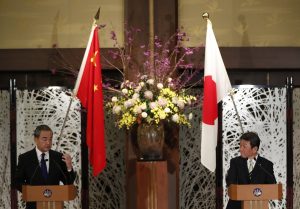In his recent visit to Japan, Chinese Foreign Minister Wang Yi seemed to get off to a good start, with an apparent demonstration of “smile diplomacy” and agreeing on guidelines for a resumption of business exchange between the two countries. However, that relative bonhomie gave way to a torrent of criticism following his comments at a joint press conference on November 24, which underscored in the minds of the Japanese public China’s hardline stance on the Senkaku Islands (known in China as the Diaoyu Islands). That in turn may reduce enthusiasm in Japan for efforts to improve relations with China.
At that press conference, Japanese Foreign Minister Motegi Toshimitsu said that at the Japan-China foreign ministerial meeting, “I conveyed Japan’s stance (on territorial rights), strongly urged positive action by the Chinese side, and confirmed that we will continue the dialogue.” Wang then had this to say: “The fact is that recently some Japanese fishing boats of unknown origin have repeatedly entered the sensitive waters off the Diaoyu Islands and China has to take a necessary response. On this issue, China’s position is clear. We will continue to defend our sovereignty. It’s important to avoid taking actions that will complicate the matter in sensitive territorial waters.”
Motegi did not expressly refute these comments at the press conference. Only later did he object, explaining that his hesitance at the press conference was because Japan and China were each supposed to speak once only. However, Motegi’s failure to immediately respond prompted a backlash from the Foreign Affairs Division of the Liberal Democratic Party and Japan’s opposition parties, who labeled it “weak-kneed diplomacy.”
The exchanged has been widely reported in Japanese media, with most of the focus on Yi’s remarks. However, the media has largely failed to report the facts behind Wang’s comments. Of the two fishing boats that left the Yaeyama fishing port on the evening of June 20, 2020, namely the Sakura-maru owned by Japanese Culture Channel Sakura and the local fishing boat Emi-maru, it would seem that Wang was referring in particular to the former. Both vessels were pursued for four hours by a Chinese Coast Guard vessel on the 21st, after moving out of the territorial waters of the Senkaku Islands. This highly unusual “pursuit behavior” was seen in Japan as China upping the ante still further. However, Wang asserts that there is a reason for it.
Japanese Culture Channel Sakura is known to be a right-wing media channel. China has expressed concern about a fishing boat owned by a conservative media entity operating in the vicinity of the Senkakus, albeit for fishing purposes, referring to it as a “Japanese fishing boat of unknown origin.” The Japanese media has omitted all this, perhaps because Wang did not refer to it by name. While media reports alone do not shape Japanese perceptions of China, it is from the media that the public tends to absorb facts about new issues like this. That makes it unfortunate that early reporting was so light on background details.
As a result, this incident will be understood in Japanese society in the same way that an incident involving the pursuit of Japanese fishing boats in June was understood, namely as a sign of China’s increasingly hardline stance in the East China Sea. Yet Wang also went on to refer to the strengthening of communication mechanisms to prevent problems in the East China Sea from worsening. This is a critical point. Statements such as these must be presented in their entirety if they are to be properly evaluated. At the same time, of course, we must give criticism where it is due, and accept fair criticism when it is given.
One of the most serious issues in Japan-China relations is the lack of trust. Another issue is mutual public sentiment, in particular Japanese perceptions of China. This is where the role of public diplomacy and media becomes important. Senior Chinese government officials are responsible for China’s public diplomacy. While domestic considerations play a part, the nature of the problem must be explained with due consideration of public opinion in the partner country. Media in Japan has an obligation to show the same balance in conveying China’s stance to the public that it does with the Japanese position.
Shina Kawashima is a professor at the University of Tokyo.
































